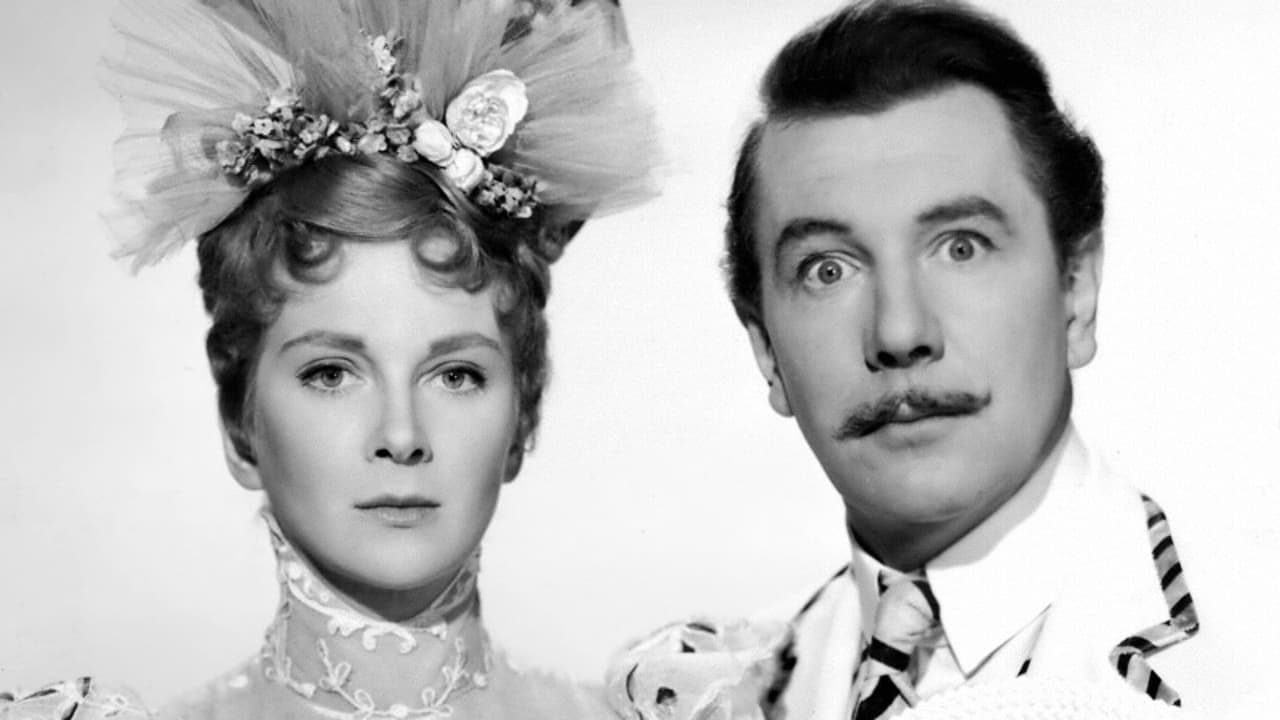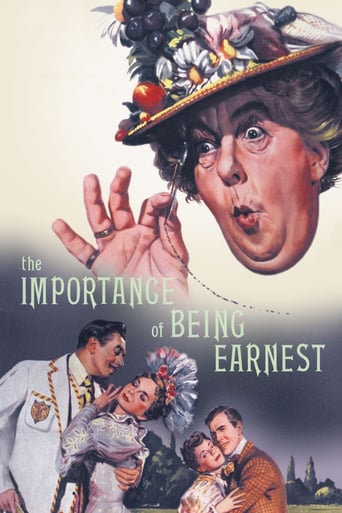GetPapa
Far from Perfect, Far from Terrible
Bluebell Alcock
Ok... Let's be honest. It cannot be the best movie but is quite enjoyable. The movie has the potential to develop a great plot for future movies
Micah Lloyd
Excellent characters with emotional depth. My wife, daughter and granddaughter all enjoyed it...and me, too! Very good movie! You won't be disappointed.
Janis
One of the most extraordinary films you will see this year. Take that as you want.
JohnHowardReid
Copyright 10 March 1953 by British Film Makers, Ltd. (In notice: 1952). Released in the U.S. by Universal International Films: 22 December 1952. New York opening at the Baronet: 22 December 1952. U.K. release through General Film Distributors: 1 September 1952. Australian release through British Empire Films: 11 December 1952. SYNOPSIS: Two young men-about-town lead double lives. One is a sophisticated worldly in London and a doting guardian in Hertfordshire; the other uses an imaginary relative to cover his sprees. COMMENT: There may have been no particular reason for filming "Ernest" in 1952, but this is certainly a splendid example of how to go about it. Asquith and his associates have captured the style and elegance of the period with admirable skill and expertise. This Technicolor film is a delight to the eye, a choice parade of period wallpaper and nineteenth-century bric-a-brac. The players fit the mood perfectly, bringing to their work an over-emphasis that is part of the style of the play.The most interesting role in the story is that of Lady Bracknell, an aristocratic bulldozer. This character was well known to be one of the most famous portraits in the gallery of Edith Evans, so it is great to see it on the screen.Michael Redgrave and Michael Denison play the two secretive young men with just the right amount of flourish. Dorothy Tutin proved a very interesting and decorative new-comer in a placid little part. Oddly, her movie career never really took off. Although she is listed with no less than 54 titles at IMDb, this is the only one I could recall. Mind you, aside from "The Beggar's Opera", "A Tale of Two Cities", "Cromwell" and :Savage Messiah", most of her acting was in TV series episodes.This is not a film which will cause you to fall off your chair, laughing. Its virtues are theatrical, literary and ornamental. But it is an effective and faithful adaptation of Wilde's play. ANOTHER VIEW: Well, when I caught up with the movie again on TV, I laughed. Often. Loud. Particularly in the First Act. Perhaps the play doesn't really suit a big screen and plays better in a more intimate atmosphere. And about 95% of the film is the same as the play. But disregarding the fact that the order and locality of some scenes has been changed, only about 85% of the play is represented in the film. Asquith has an irritating habit of cutting Wilde's wittiest lines. But with such a stylishly Victorian production and such charismatic playing (even from the normally dull Michael Denison), only the most rabid purists will notice.
wes-connors
Delightful film adaptation of Oscar Wilde's superb play about Victorian-era English manners and mix-ups. The play and performances are so close to Mr. Wilde's original words, you really can't go wrong; although, on close inspection, there are clearly some logistical problems. For example, it is shot beautifully, but without a flourish or imagination worthy of Wilde. And, cameras emphasize things that wouldn't have mattered with the otherwise marvelous cast on stage. To be fair, the film acknowledges this in its execution.Everyone is exemplary, but elderly Aunt Edith Evans really demands to be seen. She possess the role of "Lady Augusta Bracknell" for all eternity, and would be famous for merely uttering the two words "A handbag?" but, every word and phoneme slips sardonically from the mind of Oscar Wilde to dame Edith's tongue. Ms. Evans should have received some "Best Supporting Actress" notice, but this was released in 1952, not 1948, and American voters were favoring homegrown material.Pity.******** The Importance of Being Earnest (6/2/52) Anthony Asquith ~ Michael Redgrave, Michael Denison, Edith Evans, Joan Greenwood
NYLux
This movie is witty, ingenious and terribly gay. It will lift your spirits to see these characters chirping away, even if you are hospitalized in a coma.Edith Evans is Lady Bracknell, she is the funniest of the bunch, with an ideal horse-face that can only be found in families with at least five generations of British gentility. Her declamatory, accented, pompous speech is a delight, even asking for a scone sounds like the proclamation of a peerage coming from her. Michael Denison is totally affected and delightfully artificial as Algernon Moncrieff, this man could only be interested in high fashion and decorators and frankly I think part of the comedy is Oscar Wilde's trying to convince us that Victorian society was so dedicated to denial and maintaining social appearances as to believe this man would want to marry a woman when we know he would be having a nervous breakdown over her gown, the length of her veil, the right texture of paper on the invitation and the endless thank you notes. Even the way he eats a muffin is decidedly gay. Michael Redgrave is Jack Worthing and not that far from Algernon in posturing, over-dressing and mannerisms. They are perfect for each other, and they could have possibly started together the first line of haut couture and interior decor in England, instead we are led to believe that he is interested in romancing and marrying that goose of Gwendolen Fairfax as played by Joan Greenwood whose only merit is consistently dressing like she is on her way to a coronation. One of her headdresses early on is a full English garden in bloom, compressed into her limited head space, a feat that would have made even Marie-Antoinette jealous. Dorothy Tutin as Cecily Cardew is perfectly annoying. She has the charm of a high-speed dentist drill, her voice is pitched and commanding, like a school mistress admonishing her charges, and is so persistently innocent and overwhelmingly pure one feels tempted to throw her head over heels into the Moulin Rouge for training on how to become a normal human being and stop being a professional virgin. Perhaps the best performance of all is the delightful Margaret Rutherford as the eccentric, literary, Miss Letitia Prism. Her facial expressions are exquisite, her perfectly full cheeks and rotund body being the product of endless afternoons consuming jam, scones and Earl Gray tea. One regrets not being able to read the voluminous manuscript that she mistook for the baby, I am sure it could be turned into a best-seller comedy.
tedg
Dodgson's ChapelI've finally come around to this film of the famous play. The 2002 version wasn't done well and was the subject of one of my very first IMDb comments. The problem there was that the movie tried to be a movie instead of a play, and failed. This one tries only to be a non- distracting film of a play. In fact, I suppose the script is precisely that of the play with no muddling.It works marvelously and in the process becomes more of a workable movie than the later project which tried so hard.I think the reason is simple. The play had a coherent soul. (Oh, how I wonder how rare it is that we have someone that can do this, and what a tragedy that we torture them for being "deviant." Or whether certain types or art demand this on both sides.) That soul is placed in the heart of language, not situation. Its the words that matter, in fact it is the word/name "earnest," and the delicious notion that a baby can be mistaken for a book, in "moment of mental abstraction."Much of the humor or words reflected against contemporary society is based on oblivious extension of phrases and is directly influenced by Lewis Carroll, a somewhat older member of the Oxford community. Its rather wonderful seeing how this meme evolved on the stage, jumping from one clever writer to another until being extinguished by silent films. Its far more interesting than Uranian matters.But we have it here again, unsullied. The speech of Lady Bracknell has to be one of the funniest and sharpest sequence of words ever woven.I should mention a device. The play starts as a play. We see the audience, who looks much like the characters. The curtain goes up and the reality moves to the stage.Ted's Evaluation -- 3 of 3: Worth watching.

